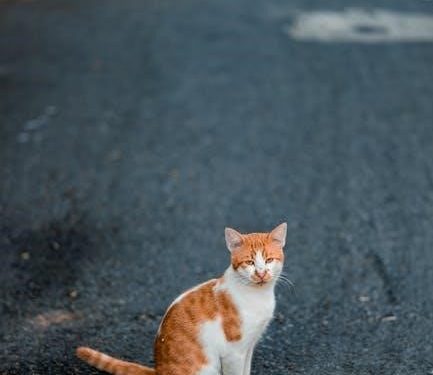
Welcome to the Warrior Cat Herb Guide, a comprehensive resource for understanding natural remedies used by Medicine Cats to heal and protect their clans․ Discover how herbs like chamomile, dandelion, and plantain are used to promote health, treat injuries, and maintain balance in the wild․ This guide explores the traditional role of Medicine Cats and the practical applications of these plants, ensuring a deeper connection with nature and the Warrior Cats universe․
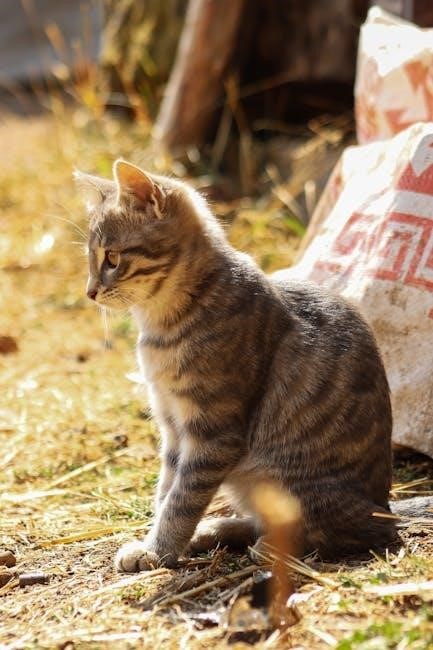
Overview of the Medicine Cat Role
In the world of Warrior Cats, Medicine Cats are essential healers, entrusted with the responsibility of maintaining the health and well-being of their clan․ Their role is deeply rooted in tradition, as they use their knowledge of natural remedies and herbs to treat injuries, cure illnesses, and prevent infections․ Medicine Cats are highly respected for their wisdom and dedication, often spending years mastering the art of healing․ They gather and prepare herbs, applying their expertise to address a wide range of ailments, from wounds to digestive issues․ Their work is vital to the survival of the clan, ensuring that warriors and other members remain strong and healthy․ The Medicine Cat’s role is not only practical but also spiritual, as they often seek guidance from StarClan to ensure their remedies are effective and aligned with the will of their ancestors․
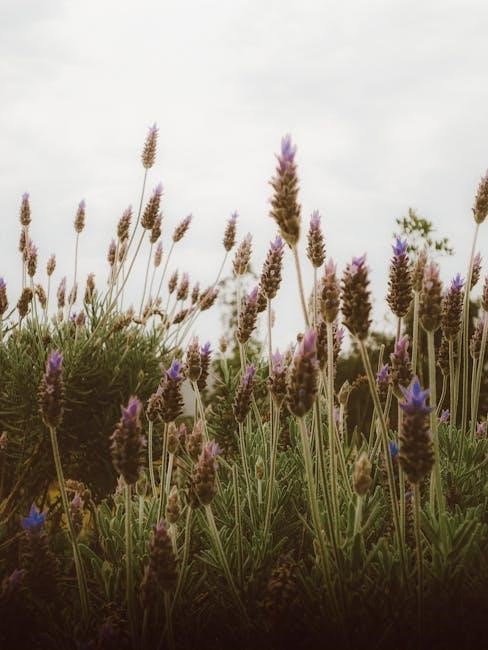
Essential Herbs for Warrior Cats
- Chamomile: Used to calm anxiety and promote relaxation․
- Dandelion: Supports digestion and overall health․
- Plantain: Applied to wounds to accelerate healing․
- Burdock Root: Aids in detoxification and treating infections․
Chamomile: Uses and Benefits
Chamomile is a versatile herb widely used by Medicine Cats to calm anxiety and promote relaxation․ Known for its soothing properties, it helps ease stress and improve sleep quality․ The herb is often administered as a tea or applied topically to soothe skin irritations and minor wounds․ Chamomile’s anti-inflammatory and antiseptic qualities make it effective for treating digestive issues and reducing fever․ In the wild, Medicine Cats commonly use chamomile to help cats overwhelmed by stress or experiencing nervousness․ Its gentle nature makes it suitable for kits and elderly cats alike․ This herb is a cornerstone in a Medicine Cat’s kit, offering natural relief for various ailments while maintaining harmony within the clan․
Dandelion: Properties and Applications
Dandelion is a highly valued herb in the Warrior Cat world, known for its versatile properties and numerous health benefits․ It is rich in vitamins and minerals, making it an excellent remedy for boosting overall health․ The roots and leaves of the dandelion plant are commonly used by Medicine Cats to treat digestive issues, such as constipation and upset stomachs․ Additionally, dandelion has natural diuretic properties, helping to flush out toxins and reduce bloating․ Its anti-inflammatory qualities also make it effective for soothing skin irritations and minor wounds․ In the wild, Medicine Cats often use dandelion to cleanse the body and restore balance, ensuring their clan members remain strong and healthy․ This herb is a reliable and natural solution for various ailments, showcasing its importance in the Medicine Cat’s arsenal․
Plantain: A Versatile Healing Herb
Plantain is a highly versatile and widely used herb in the Warrior Cat world, renowned for its healing properties․ It is particularly effective in treating wounds, as it possesses antiseptic and anti-inflammatory qualities that help prevent infection and promote healing․ Medicine Cats often use plantain to soothe burns, cuts, and scratches, making it a vital component of their herbal remedies․ Additionally, plantain can be used to treat digestive issues, such as upset stomachs, and is known to alleviate symptoms of sore throats․ Its leaves are typically chewed or crushed to release their beneficial properties, which can then be applied directly to the affected area or consumed․ This herb is a cornerstone of a Medicine Cat’s knowledge, offering reliable and natural solutions for various ailments, making it indispensable in the wild․

Burdock Root: Its Role in Medicine
Burdock root is a valuable herb in the Warrior Cat world, primarily used for its purifying and detoxifying properties․ Medicine Cats often use it to treat skin conditions, such as eczema or rashes, by applying crushed root directly to the affected area․ It is also known to support the immune system and aid in digestion, making it a versatile remedy for various ailments․ Burdock root can be consumed as a tea or applied topically to wounds to promote healing and reduce inflammation․ Its ability to cleanse the body of toxins makes it a key herb for maintaining overall health․ This root is especially prized for its effectiveness in treating persistent or chronic conditions, showcasing its importance in a Medicine Cat’s herbal arsenal․
Herbs for Wound Care
Herbs like comfrey, horsetail, and stinging nettle are essential for treating wounds, promoting healing, and preventing infection․ They help accelerate recovery, strengthen tissue, and reduce inflammation naturally․
Comfrey: Accelerating Healing
Comfrey, known as Symphytum officinale, is a potent herb renowned for its ability to accelerate healing in wounds․ It is rich in vitamins, minerals, and allantoin, which stimulates cell regeneration and strengthens tissue․ Medicine cats often use comfrey to treat injuries, as it helps close wounds faster and reduces the risk of infection․ Its anti-inflammatory properties make it ideal for soothing swollen or bruised areas․
Comfrey can be applied topically as a poultice or infused into a tea for internal use․ However, it should not be used on deep wounds or internal injuries, as it may trap bacteria beneath the skin․ Despite its effectiveness, comfrey should be used cautiously and only under the guidance of an experienced Medicine Cat․
Horsetail: Strengthening Wounds
Horsetail, or Equisetum arvense, is a valuable herb known for its ability to strengthen wounds and promote resilience in the healing process․ Rich in silica, it enhances tissue repair and fortifies the skin, making it less prone to reopening․ Medicine cats often use horsetail to treat minor lacerations or abrasions, as it helps restore the skin’s natural barrier and reduces inflammation․
Horsetail also possesses astringent and antiseptic properties, which prevent infection and promote a clean environment for healing․ It can be applied topically as a paste or infused into a tea for internal use․ While effective, horsetail is best used for superficial injuries and should not replace more potent remedies for deeper wounds․ Its versatility makes it a staple in a Medicine Cat’s herbal arsenal․
Stinging Nettle: Reducing Inflammation
Stinging nettle, or Urtica dioica, is a powerful herb renowned for its anti-inflammatory properties, making it a valuable resource for Medicine Cats․ Its leaves contain compounds that reduce swelling and alleviate pain, making it ideal for treating injuries and allergic reactions․ When applied topically as a paste, stinging nettle can soothe irritated skin and reduce redness․
Medicine cats often use stinging nettle to calm allergic reactions or insect bites․ Its natural antihistamine properties help neutralize itching and inflammation․ While stinging nettle is effective for minor injuries, it is not a cure for severe wounds․ Combined with other herbs, it enhances healing and provides comfort to injured cats, proving its worth in the Medicine Cat’s herbal kit․
Herbs for Digestive Issues
Natural herbs like wild garlic, watercress, and tansy are used by Medicine Cats to aid digestion and treat intestinal problems, ensuring clan members stay healthy and strong․
Wild Garlic: A Natural Remedy
Wild garlic, known for its strong scent and flavor, is a potent herb used by Medicine Cats to treat various digestive issues․ Its antibacterial and antiviral properties make it effective against stomach infections and parasites․ Medicine Cats often crush the leaves and mix them with water to create a remedy for upset stomachs․ Wild garlic also helps reduce inflammation in the digestive tract, promoting healing and restoring balance to a cat’s system․ Fresh leaves are preferred for maximum potency, but dried versions can be used during colder months when fresh supplies are scarce․ This versatile herb is a staple in many Medicine Cat kits, ensuring clans remain healthy and vigorous․
Watercress: Improving Digestion
Watercress is a nutrient-rich herb widely used by Medicine Cats to support digestive health․ Its high vitamin and mineral content makes it an excellent natural remedy for cats suffering from indigestion or upset stomachs․ The peppery flavor of watercress helps stimulate appetite and improve digestion, while its antibacterial properties combat harmful bacteria in the gut․ Medicine Cats often feed fresh watercress leaves to their clanmates to prevent digestive issues or mixed with other herbs to enhance its healing effects․ Regular consumption of watercress also helps maintain healthy gut flora, ensuring overall well-being․ This versatile herb is particularly beneficial for cats recovering from illness or those with sensitive digestive systems, making it a valuable addition to any Medicine Cat’s kit․
Tansy: Treating Intestinal Problems
Tansy is a powerful herb used by Medicine Cats to treat intestinal issues, particularly those caused by parasites like worms․ Its strong, bitter taste makes it effective in expelling harmful organisms from the digestive system․ Medicine Cats often prepare tansy by infusing it in water or chewing the leaves to release its potent oils․ While tansy is highly effective, it must be used with caution due to its toxicity in large doses․ It is commonly administered to cats showing symptoms of bloating, lethargy, or abdominal pain․ Tansy also helps restore balance to the digestive system after an infection, promoting overall health․ This herb is a vital tool for Medicine Cats, ensuring their clanmates remain free from debilitating intestinal parasites and maintain optimal health․
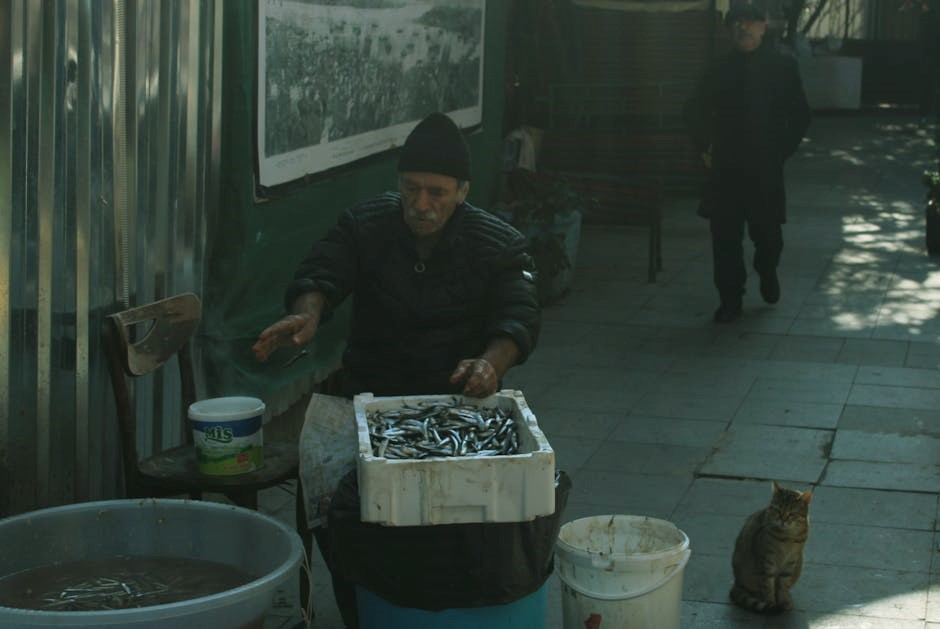
Herbs for Pain Relief
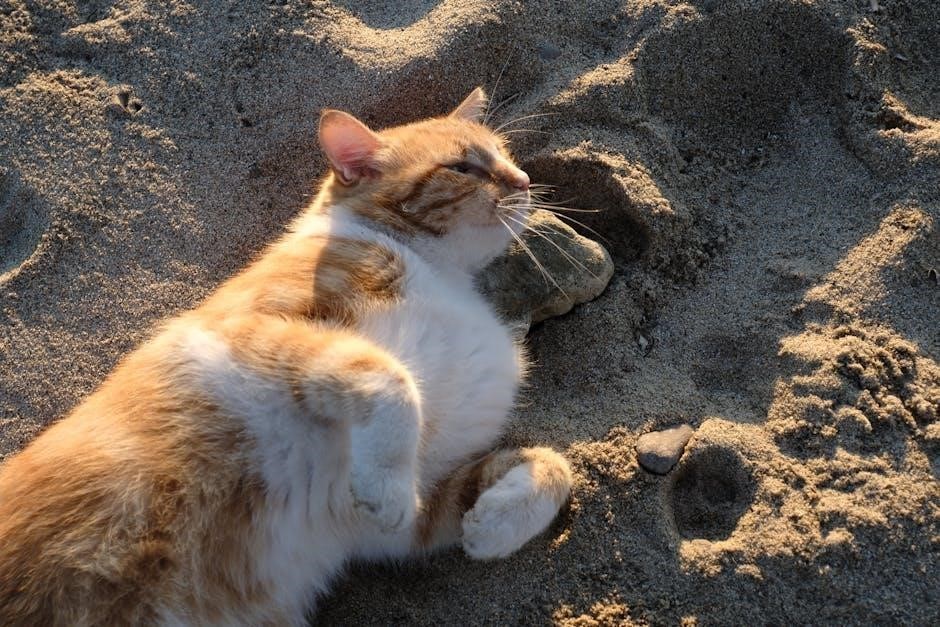
Herbs for Pain Relief play a crucial role in a Medicine Cat’s kit, offering natural solutions to alleviate discomfort and inflammation, sourced from the wild to restore mobility and well-being․
Willow Bark: Nature’s Aspirin
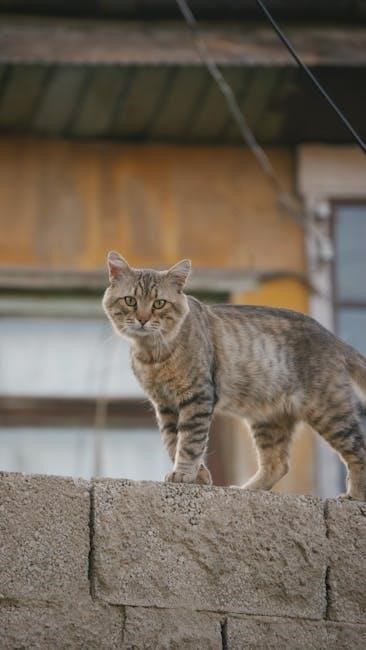
Willow bark is a natural remedy long used by Medicine Cats to alleviate pain and reduce inflammation․ Containing salicin, a compound similar to aspirin, it helps ease aches and soothe injured cats․ The bark can be chewed or made into a paste, often mixed with water to create a healing infusion․ It is particularly effective for joint pain, muscle soreness, and post-injury discomfort․ Medicine Cats value willow bark for its ability to restore mobility and comfort without causing harm․ However, it should be used sparingly, as excessive consumption can lead to stomach issues․ This versatile herb remains a cornerstone in a Medicine Cat’s kit, offering relief and promoting recovery in the wild․
Clover: Alleviating Pain
Clover is a trusted herb among Medicine Cats for its ability to alleviate pain and reduce inflammation․ The leaves and flowers of the clover plant contain compounds that help soothe aches and discomfort, making it an ideal remedy for injured warriors․ Medicine Cats often use clover to treat wounds, bruises, and sore muscles, either by chewing the leaves or brewing them into a healing tea․ Its mild yet effective properties make it suitable for cats of all ages․ Clover is also known to promote relaxation, helping cats recover from the physical and mental strains of battle․ This versatile herb is a staple in any Medicine Cat’s kit, offering natural relief and supporting the overall well-being of the clan․
Herbs for Respiratory Problems
Herbs like mint and juniper are essential for treating respiratory issues in warrior cats, helping to ease breathing and reduce coughs, ensuring swift recovery from respiratory distress․
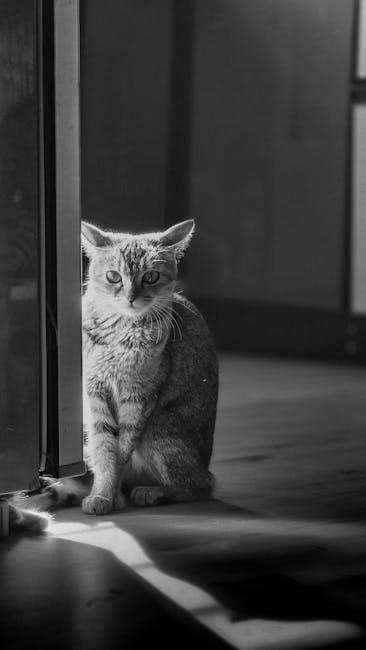
Mint: Easing Breathing
Mint is a powerful herb used by Medicine Cats to alleviate respiratory issues, offering a cooling effect that helps clear congested airways and soothe coughs․ Its natural decongestant properties make it ideal for treating breathing difficulties, often caused by harsh weather or infections․ Medicine Cats typically chew fresh mint leaves and apply them to the affected cat’s chest or nose to release its invigorating scent․ This remedy is particularly effective for cats suffering from persistent coughs or congestion, as it helps ease discomfort and restore normal breathing patterns․ Mint’s refreshing qualities also make it a popular choice for calming the chest and reducing irritation, ensuring a swift recovery from respiratory ailments․
Juniper: Treating Coughs
Juniper is a natural remedy frequently used by Medicine Cats to treat persistent coughs and respiratory discomfort․ The berries of the juniper plant contain compounds that help reduce inflammation in the throat and chest, providing relief from irritation․ Medicine Cats often crush the berries and mix them with water to create a soothing paste, which is then applied to the affected cat’s chest or throat․ Juniper’s antiseptic properties also aid in preventing infections that may worsen coughs․ This herb is particularly effective for cats exposed to harsh environmental conditions or those suffering from seasonal allergies․ Its ability to alleviate respiratory distress makes it a valuable resource in the Medicine Cat’s arsenal, ensuring cats can breathe easier and recover swiftly from cough-related ailments․
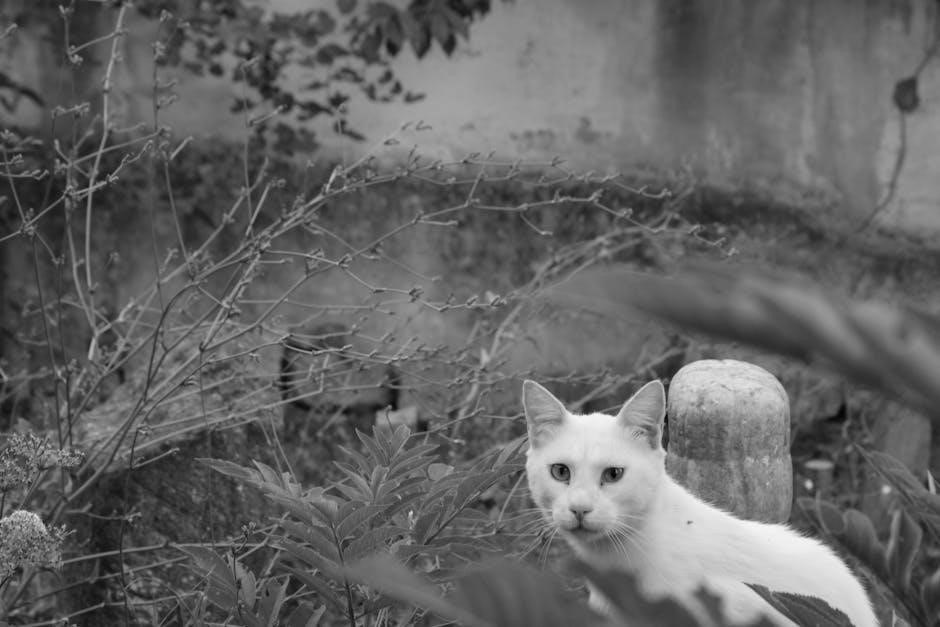
Herbs for Mental Health
Herbs play a crucial role in maintaining mental well-being among Warrior Cats․ In their stressful environment, Medicine Cats utilize plants like valerian and borage to promote relaxation and reduce anxiety, fostering a harmonious clan atmosphere․
Valerian: Calming the Mind
Valerian is a powerful herb known for its calming effects, often used by Medicine Cats to treat anxiety, stress, and restlessness․ Its soothing properties help warriors relax, especially during tense or traumatic events․ The root of the valerian plant is typically chewed or infused into water, providing a natural sedative effect without drowsiness․ It is particularly useful for cats experiencing emotional distress or difficulty sleeping․ Medicine Cats value valerian for its ability to promote mental clarity and balance, ensuring their clan members remain focused and resilient․ This herb is also safe for long-term use, making it a trusted remedy in maintaining the mental well-being of the clan․
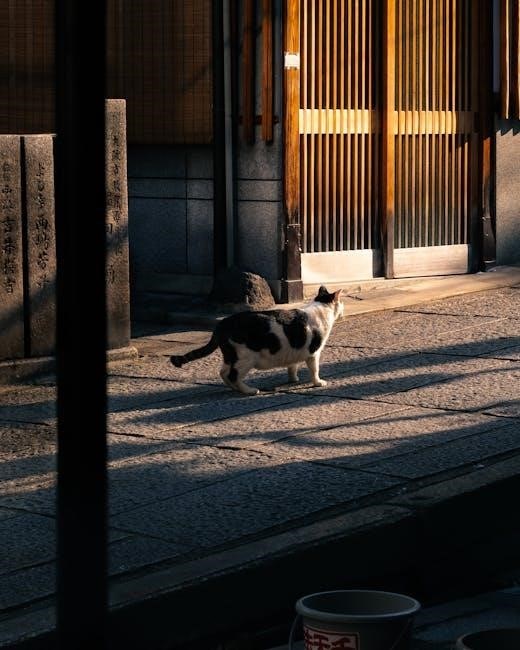
Borage: Reducing Stress
Borage is a natural remedy highly valued by Medicine Cats for its calming effects on the mind and body․ Its flowers and leaves contain properties that help reduce stress and anxiety, making it an essential herb for warriors dealing with emotional strain․ Medicine Cats often prepare borage as a soothing tea or infusion, which is administered to cats experiencing nervousness or tension․ The herb works to balance the emotions, promoting relaxation without causing drowsiness․ Borage is particularly effective during times of high stress, such as battles or conflicts, helping to maintain mental clarity and focus․ Its ability to reduce anxiety ensures that warriors remain resilient and composed, fostering a healthier and more harmonious clan environment․
The Warrior Cat Herb Guide offers a valuable insight into the natural remedies that Medicine Cats use to heal and protect their clans․ By understanding the properties and applications of these herbs, warriors can better appreciate the balance between nature and their way of life․ This guide serves as a testament to the ingenuity and wisdom of Medicine Cats, who have passed down their knowledge through generations․ Whether for treating injuries, calming the mind, or soothing digestive issues, these herbs are integral to the survival and well-being of the clan․ This guide not only honors the traditions of the Warrior Cats but also provides a practical resource for anyone seeking to learn more about the healing power of nature․